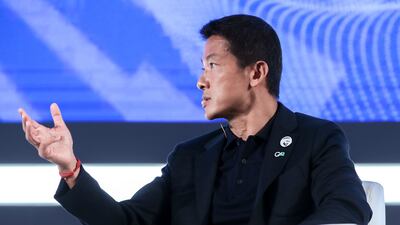G42, the Abu Dhabi-based artificial intelligence company, has denied any links with the Chinese government and military, dismissing the allegations as "unfounded and irresponsible".
In response to the claims that surfaced in the US this week, G42 said that while it had partnerships with "some" Chinese entities, "such engagements are standard practice among global technology companies".
They are part of having "established a worldwide network of partnerships over time", the company said in a statement on Thursday.
"G42 operates within strict compliance and ethical boundaries, adhering to all applicable laws and regulations. Any innuendo suggesting otherwise is unfounded and irresponsible," it said.
On Tuesday, the US House of Representatives was presented with a letter by congressman Mike Gallagher that made claims about G42's business ties with Chinese entities.
Among the entities named were technology major Huawei and the Beijing Genomics Institute, companies blacklisted in the US and with which G42 was alleged to have maintained "active relationships".
The letter, first obtained by The New York Times, claimed the hardware and software developed by G42 could be misused and pose a threat to national security.
G42 has business partnerships with several US companies, including Microsoft, computer maker Dell and, most recently, ChatGPT developer OpenAI.
Mr Gallagher urged Washington to add G42, along with its 13 affiliates and subsidiaries, to the Entity List, a trade blacklist that prohibits companies from accessing US services, products and technology without government approval.
"Without restrictions on G42, the hardware and software developed by these US companies are at significant risk for diversion to G42's PRC-based affiliates," Mr Gallagher wrote in the letter, referring to China.
Mr Gallagher, a Republican is chairman of the House select committee on the Chinese Communist Party. The committee was formed in 2023, oversees economic and security relations between the US and China, the world's two biggest economies.
"We categorically deny the allegations in the recent New York Times article and the letter from the US Congress House select committee on the Chinese Communist Party to the US Department of Commerce regarding G42's supposed connections to the Chinese government and their military industrial complex," G42 said.
Mr Gallagher's letter also alleged that G42 group chief executive Peng Xiao "operates and is affiliated with an expansive network of companies that materially support" technological advancements in China's military.
G42 denied the claim and said "in the field of advanced technologies, we have pursued a commercial strategy since 2022 to fully align with our US partners and not to engage with Chinese companies", noting that this was emphasised by Mr Xiao in a media interview last month.
In a brief statement to The National, G42 said "at the moment, we are unable to comment further".
The US has been scrutinising the operations of Chinese technology companies, claiming they pose a threat to American national security.
The economic and trade rivalry between the countries escalated during the administration of former president Donald Trump, when Washington began vigorously cracking down on Chinese entities, imposing sanctions and adding several organisations into the Entity List.
Huawei was among the major companies blacklisted by the US.
The smartphone maker, a key rival to Apple and Samsung Electronics, was forced to cease collaborating with US companies, eventually losing access to Google's Android system, the most widely used mobile operating system in the world.


